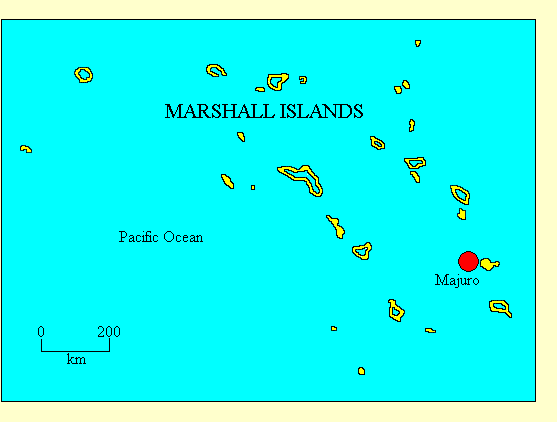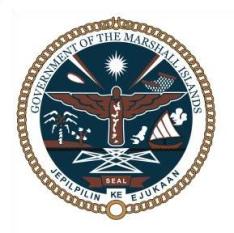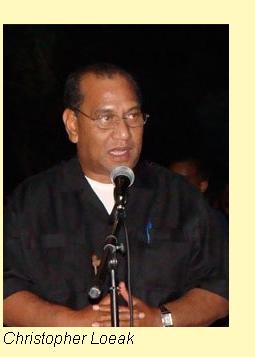
REPUBLIC OF THE MARSHALL ISLANDS
• Official name: Republic of the Marshall Islands
• Location: Pacific
• International organisations: African, Caribbean and Pacific Group of States, Pacific Islands Forum, United Nations.
• Borders: None
• Coastline: Pacific Ocean
• Land area: 181 Km2
• Population: 62,000
• Annual GDP (PPP) per capita: US$2,500 (2009 CIA estimate). World ranking: 142
• Ethnicity: Most of the population are Marshallese, a Micronesian people.
• Languages: English is the official language. The people speak Marshallese, a Micronesian language.
• Religion: Most of the population are Protestant Christians.
• Form of government: Presidential democratic republic.

• Capital: Majuro
• Constitution: The
Constitution of the Marshall Islands came into effect on 1 May 1979.
• Head of state: The President, elected by the legislature from among its own members for a four-year term.
• Head of government: The President, who appoints the Cabinet.

• Legislature: The Marshall Islands has a unicameral legislature, the
Parliament (Nitijela), which has 33 members
elected for four-year terms from single- and multi-member constituencies.
• Electoral authority: Marshall Islands Electoral Administration (no website) administers national elections.
• Freedom House 2011 rating: Political Rights 1, Civil Liberties 1
• Transparency International Corruption Index: no rating (Freedom House notes "corruption is a serious problem.")
• Reporters Without Borders Press Freedom 2010 Index: no rating
• Heritage Foundation Economic Freedom 2010 Index: no rating
Political history
The Marshall Islands were discovered by the Spanish in 1526, and were visited and named by the English seacaptain
John Marshall in 1799, but were too small and remote to interest the
European powers until the late 19th century. In 1885 they became a German protectorate, although they were of
little economic value. They were administered as part of German New Guinea from 1906. The islands were occupied by
Australian troops during World War I and in 1920 they were handed over to Japan as a League of Nations mandate.
Kwajalein and Eniwetok atolls were scenes of heavy fighting during World War II. In 1947 the Marshalls became part
of the United States Trust Territory of the Pacific Islands. The US used the islands for a series of nuclear tests.
The Marshalls became autonomous as the Republic of the Marshall Islands in 1979, but remained closely
linked to the US through a compact of association. In 1986 the Trust Territory was dissolved, and in December 1990
the Marshalls became fully independent. Since independence the reformist United Democratic Party has been the main political force
in the country. The UDP lost the 2007 elections, and an opposition member, Litokwa Tomeing, was chosen as President.
In November 2009, however, he lost a confidence vote in the Parliament, and was replaced by the UDP's
Jurelang Zedkaia. Rivalry between China and Taiwan (with which the Marshall Islands maintains diplomatic relations) for
influence in the country has led to suspicions of bribery and ballot rigging, and may have been behind the change. After elections in
November 2011, Zedkaia sought a full term, but the legislature chose
Christopher Loeak as president.
Although Freedom House gives the Marshall Islands a "1" for political rights, the country has suffered from serious
election deficiencies, particularly during the 2007 legislative elections. Freedom House noted: "In the November 2007
legislative polls, the voting was poorly managed. Polling stations opened late in the capital, some in the outer islands
ran out of ballots, and overseas voters had a short window to request and return ballots. International monitors reported
irregularities, including voters being told to put their names on ballot envelopes in clear violation of voting rules.
Vote counting and recounts continued for weeks after the elections, and by the end of 2007, up to 75 percent of overseas
votes had been declared invalid."
Updated January 2012
|

